I have a deep love for all books about the end of the world and the apocalypse. It’s exciting! I love the speculation of what could happen. Because zombies could totally happen. Or angels. Or destruction by walking trees. WHO KNOWS. Today I have a list of Young Adult books about the apocalypse and the end of the world. […]
Add a CommentViewing: Blog Posts Tagged with: APOCALYPSE, Most Recent at Top [Help]
Results 1 - 25 of 27
Blog: Perpetually Adolescent (Login to Add to MyJacketFlap)
JacketFlap tags: Book News, young adult, Lists, Apocalypse, best books, Cait Drews, Add a tag
Blog: OUPblog (Login to Add to MyJacketFlap)
JacketFlap tags: Books, Sociology, Religion, apocalypse, America, North Carolina, christianity, religious freedom, new testament, *Featured, Arts & Humanities, Conservative Christian theology, American Christians, Building God's Kingdom, conscience causes, Inside the World of Christian Reconstruction, Julie Ingersoll, ministerial exemption, Add a tag
Are Christians persecuted in America? For most of us this seems like a preposterous question; a question that could only be asked by someone ginning up anger with ulterior motives. No doubt some leaders do intentionally foster this persecution narrative for their own purposes, and it’s easy to dismiss the rhetoric as hyperbole or demagoguery, yet there are conservative Christians all across the country who genuinely believe they experience such persecution.
The post Persecuted Christians in America appeared first on OUPblog.
Blog: The Mumpsimus (Login to Add to MyJacketFlap)
JacketFlap tags: film, Writing, culture, apocalypse, guns, morality, Michael Haneke, Add a tag
A friend pointed me toward Sigrid Nunez's New York Times review of Emily St. John Mandel's popular and award-winning novel Station Eleven. He said it expressed some of the reservations that caused me to stop reading the book, and it does — at the end of her piece, Nunez says exactly what I was thinking as I put the book down with, I'll confess, a certain amount of disgust:
If “Station Eleven” reveals little insight into the effects of extreme terror and misery on humanity, it offers comfort and hope to those who believe, or want to believe, that doomsday can be survived, that in spite of everything people will remain good at heart, and that when they start building a new world they will want what was best about the old.I don't mean this post to be about Station Eleven, because I didn't finish reading it and for all I know, if I'd finished reading it I might disagree with Nunez. I bring it up because even if, somehow, Nunez is wrong about Station Eleven, her points are important ones in this age of popular apocalypse stories.
Let me put my cards on the table. I have come to think stories that give readers hope for tolerable life after an apocalypse are not just inaccurate, but despicable.
We are living in an apocalypse. Unless massive changes are made in the next few decades, it's highly likely that the Earth's biosphere will alter drastically enough to kill off most forms of life. At the least, life in the next 100-200 years is likely to be less pleasant than life now (if you think life now is pleasant). Writing apocalypse stories that mitigate these facts lulls us into complacency. Such stories are their own form of global warming denialism. (Of course, if you are a global warming denialist, go right ahead — write and enjoy such stories!)
Tales of surviving an apocalypse give us comfort fiction, a fiction predicated on identifying with the survivors and giving the survivors something worth surviving for.
It is highly unlikely that you, I, or anybody else would be a survivor of an actual apocalypse, and it is even more unlikely that, were we to survive, the post-apocalyptic world would be worth staying alive to see. To imagine yourself as a survivor is to evade the truth and to indulge in a ridiculous fantasy. To imagine yourself as a successful survivor — someone who doesn't suffer terribly before finally, painfully dying — is even worse.
To tell stories of apocalypse that seek to be at least somewhat realistic and yet are not as painful as stories of actual, historical catastrophes is sheer escapist fantasy. Apocalypse stories that do not want to be escapist fantasies must be as harrowing and painful as the most awful stories of the Nazi Holocaust, the Khmer Rouge's atrocities in Cambodia, the Rwandan genocide.
I'd think this would be obvious, but many people ignore the fact: to tell a story of an apocalypse is to tell a story in the midst of mass death.
To tell a story of apocalypse that is not limited to a small area — to tell a story of the end of the whole world — is to tell a story about mass death on a scale far beyond the worst historical atrocities.
To tell a story of apocalypse in which people's lives are not even as difficult or painful as the lives of millions and millions of people currently alive on Earth moves beyond escapist fantasy and into the realm of idiotic irresponsibility. (This, perhaps, is why some of the better apocalypse/dystopia stories are written by people who are not middle-class white Americans.)
In Eyes Wide Open, Frederic Raphael reported Stanley Kubrick's assessment of Schindler's List: "Think that was about the Holocaust? That was about success, wasn’t it? The Holocaust is about six million people who get killed. Schindler’s List was about six hundred people who don’t."
Obviously, the appeal of such stories is that they let us indulge in the fantasy of success. We love rags-to-riches stories for the same reason. We love stories about our soldiers wiping out lots of evil enemies because we escape imagining ourselves to be the enemy in the sniper's sights.
Who is this "we"? That's a good question for any story that aims for an audience to identify with protagonists, but it's especially good to ask of apocalypse stories. Do you read Left Behind imagining yourself to be one of the good, one of the saved? Do you read Station Eleven imagining that yes, you too could find a way to make a life for yourself in this world?
Or do you imagine yourself among the diseased, the tortured, the suffering, the unsaved, the dead?
"But," you say, "such stories offer us visions of human goodness even in the face of adversity! They alleviate pessimism. They help us to hope."
And that is why they are detestable.
The popular Anne Frank statement that Nunez alludes to in her Station Eleven review — "I still believe, in spite of everything, that people are truly good at heart" — was not written in Bergen-Belsen. The story of Anne Frank is not complete until you tell the story of her and her family's suffering and slow death in a concentration camp. A survivor who claimed to have talked with Anne said she was weak, emaciated; that she suspected her parents to be dead; that she did not want to live any longer.
(If you want a happy ending, stop your story before the end.)
To write a story in which apocalypse is not especially awful — or is, even worse, somehow desireable — does nothing to help prevent the apocalypse we face, the apocalypse we live in.
Mass death should not be a self-help allegory.
The Walking Dead is popular with a lot of these folks. Step into a gun shop and you're plenty likely to hear at least one person talking about "the zombie apocalypse". It's a code phrase and an allegory: a code for the end of the boring world, an allegory for the time when the well-prepared (white, patriarchal) militia will ascend to its rightful place of honor, when the weak liberals and anti-gunners will die the sad deaths they so deserve, when it will be open season on all the zombies (read: immigrants, black people, etc.). Dreamers dream themselves among the survivors. They dream themselves into heroism. Instead of boring everyday life, they get to show their courage and strength and preparation.
Don't feel your life lets you express your inner heroism? Imagine yourself a survivor of apocalypse. Now you have a hero story.
Imagine yourself finally getting to use those tens of thousands of 5.56 rounds you stockpiled back when ammo was cheap. (You were one of the smart ones. Where are all the people who made fun of you now? They're dead, you're alive. You're the real man. Good for you. You win!)
Don't imagine yourself dying slowly, painfully. Don't imagine yourself wanting to die. Don't imagine disease, starvation, brutality.
We want stories to make us feel good about humanity, or at least about ourselves. We don't want realistic apocalypse stories.
That's what's behind so much of this dreck, isn't it? That somehow we know we're facing doom, and we don't want to feel bad about our own participation in that doom. We want doom to be on our own terms.
For the militia type, apocalypse stories are a way to imagine yourself into heroism. For the relatively wealthy and privileged, apocalypse stories are an opportunity to imagine our way out of the oppressions we benefit from.
(When I've assigned students to read Octavia Butler's Parable of the Sower, there's always been someone who says, "This doesn't feel like science fiction. This feels real." True. And it's a real that hurts. Because it should.)
If you want to tell an apocalypse story, tell a story about well-intentioned people suffering and dying. Tell a story about people like yourself not only being helpless in the face of catastrophe, but being witless progenitors of it.
(One of my favorite apocalypse stories is Wallace Shawn's The Fever. It's a story of the apocalypse of a well-intentioned man.)
Don't tell a story about how people like yourself are such great survivors. In truth, they probably aren't, and indulging in a fantasy of your own people's survival is breathtakingly arrogant in a story set amidst mass death.
(If the effects of your imagined apocalypse are less painful than the effects of Hurricane Katrina, you are writing despicable kitsch.)
I'm not saying tales of apocalypse are inevitably drivel, or even that they have to be a parade of endless horror, brutality, and suffering (though they should probably be mostly that). I'm saying we don't need apocalypse kitsch any more than we need Holocaust kitsch.
Watch the movies Grave of the Fireflies and Time of the Wolf. One is a historical film about the firebombing of Tokyo, the other is about a near-future apocalypse, its cause unknown, its effect coruscatingly clear. It's these films' affect that is most interesting to me, the ways they show disaster and the response to disaster, the ways they make you feel, and what those feelings are. These are not nihilistic stories, they don't deny human compassion and even goodness, but they also don't soft-pedal the suffering that happens with the end of a world.
Or think of it this way: If you had a time machine and could go back to Anatolia before 1915, Germany in the mid-'30s, Cambodia in the early '70s, Rwanda in the early '90s — if you could go back to those times and write stories, what sort of stories would you write? Stories of people surviving impending apocalypse?
If you want to tell stories to help prevent the extinction of the biosphere, don't tell stories that make that extinction seem bearable.
If you want to imagine the end of the world, realize what you are imagining.
Blog: The Mumpsimus (Login to Add to MyJacketFlap)
JacketFlap tags: Movies, film, Cheney publications, apocalypse, race, Joon-ho Bong, white supremacy, video essays, Press Play, Add a tag
Press Play has now posted my new video essay with a brief accompanying text essay about the great new science fiction action movie political parable satire call to revolution Snowpiercer, directed by Bong Joon-Ho, a filmmaker I am especially enamored of. (Memories of Murder is easily among my favorite movies of the last 15 years, and back in 2010 I defended Bong's previous film, Mother, from the criticisms of Richard Brody at the New Yorker.)
As a little bit of extra, below the fold here I'll put some thoughts on elements of the remarkable ending of the film...
First, for some information on the background and references of Snowpiercer, see Scott Tafoya's piece at RogerEbert.com, and for a good analysis of the revolutionary ideology of the film, see "Smash the Engine" by Peter Frase at Jacobin.
The audacity I see in the ending of Snowpiercer comes not just from its framing of revolution as something that must smash the logic of the system, but also from the way it shows that system to be not just hierarchical in terms of class, but of also being fundamentally racialized.
First, there is the inescapable fact that most of the people who have been saved from the apocalypse are white and English speaking. Even the people at the back of the train, though more diverse than the people in the front, are predominantly white and English speakers. All of the positions of highest power in the train are positions held by white English speakers, and the ultimate positions of power are held by white men and passed on to white men (Wilford to Curtis).
As Curtis moves closer and closer to the front, the white supremacy becomes obvious. There's the classroom, where the vast majority of students are very white (and often blonde), with a few Asians in there (the pre-apocalypse notion of Asians as educational high achievers is thus replicated in the train), and one black girl (at least that I saw). The overall effect is of lily-whiteness, with a few special people added.
The people at the dance party are almost entirely white.
The women getting their hair styled are white.
It's worth noting, too, how so much of what we see in the front cars evokes the old white world, a world of the 1920s-1950s — an America before the successes of the civil rights movement, of women's liberation struggles, of gay liberation, etc. (The car where everyone is taking drugs evokes even earlier ideas. It's like an opium den, a powerful force in the orientalist imagination of the yellow peril in the 19th and early 20th centuries, and a setting with plenty of cinematic history.)
Early in the film, Curtis tells Edgar that once they get to the front of the train, things will be different. "But how different, really?" the film asks at the end. "Know your place!" Mason (Tilda Swinton) tells the rabble. Curtis learns what his place is from Wilford: the place of the white patriarch.
That system cannot be reformed. It will do no good to have somebody else in charge of the engine. The logic of the system must not be reformed, it must be defied and destroyed.
And thus the ending, which stops the train's circular journey and potentially annihilates the last remnants of humanity.
The system is so corrupt, so incapable of reform, that what is known to be left of humans is worth destroying rather than continuing along the same tracks.
If there is to be a future for humanity, it looks like this, the new Adam and Eve:
They might be destroyed by the cold, white world. They might be a meal for the white polar bear. But maybe, somehow, they will survive and discover or create a new world, a world where humans are on a different journey, subject to a different system, not oppressed by the cold, unbearable whiteness.
Bong leaves it to us to imagine their fate.
Blog: The Mumpsimus (Login to Add to MyJacketFlap)
JacketFlap tags: politics, culture, apocalypse, guns, violence, Add a tag
At the Daily Beast, Cliff Schechter has a piece titled "How the NRA Enables Massacres", which, despite some hyperbolic language, is worth reading for the general information, as is his piece on a visit to the recent NRA convention. Schechter isn't reporting anything new, and the pieces are superficial compared to some earlier writings on all this, but it's always worth reminding ourselves that gun massacres in the US are part of a culture that has been carefully manufactured, protected, nurtured, enflamed.
I've written a lot about guns and gun culture here over the past few years. Writing those posts from scratch now, I would change occasional wording in some of them, clarify a few points, etc. (the hazards of writing on the fly), but you could take almost anything I've written previously and apply it to the latest massacre.
The place of hegemonic masculinity in this type of event is especially clear this time, but it's been present before and is a common component to why this sort of thing happens. It's a racialized hegemonic masculinity, too, the deadly scream of the angry white man — a sense of entitlement thwarted. In the book Angry White Men: American Masculinity at the End of an Era, Michael Kimmel writes: "As men experience it, masculinity may not be the experience of power. But it is the experience of entitlement to power" (185).
The NRA and the gun manufacturers have become experts at stoking that sense of entitlement and profiting off of it. At every possible moment, the NRA, the manufacturers, and their minions point out as many threats to power as they can imagine, and then they offer their commodities as tools for stabilizing and strengthening that power.
The patterns have been in play at least since the 1980s. James William Gibson's Warrior Dreams: Paramilitary Culture in Post-Vietnam America was published 20 years ago, but it's at least as relevant today as it was then. Consider, for instance, his discussion of mass murderers:
Although several of these paramilitary killers went after former co-workers and bosses, and some even killed their families, most targeted a distinct social group... Thus, Huberty seems to have considered the Latinos at the San Ysidro McDonald's to be Vietnamese. Patrick Purdy was found to have been a white supremacist; his choice of Asian schoolchildren was not an accident. Canadian Marc Lepine shot only women. (237)Gibson's chapter "Bad Men and Bad Guns: The Symbolic Politics of Gun Control" is useful reading for these conversations, and reminds us of the deep history here. Most importantly, it helps show why so many past efforts have been ineffective (though profitable for both the NRA and the gun control organizations). What would have stopped the mass shootings? he wonders. Most of the proposed and enacted legislation would not have. A more accessible and effective mental health system might have helped in some cases. But:
Most of all, stopping the madmen would have required understanding that they were not isolated "deviants" who simply invented their mayhem out of thin air and looked and acted completely differently from the "ordinary" people in the mainstream of American culture. On the contrary, in their killings they gave expression to some of the most basic cultural dynamics of the decade — in the face of either real or imaginary problems, declare an enemy responsible and go to war....A year after Gibson's book was published, Timothy McVeigh drove to Oklahoma City and showed exactly what the angry white male paramilitary culture stood for.
To argue, then, that many of these murderers could have been stopped solely by increased gun control is to pretend that the social and political crises of post-Vietnam America never occurred and that the New War did not develop as the major way of overcoming those disasters. Paramilitary culture made military-style rifles desirable, and legislation cannot ban a culture. The gun-control debate was but the worst kind of fetishism, in which focusing on a part of the dreadful reality of the decade — combat weapons — became a substitute for confronting what America had become. (263-264)
Siege imagery pervades and energizes that culture, as demonstrated with the Cliven Bundy affair. One shift it has taken after the end of the Cold War is toward a more general apocalypticism. Instead of yearning for war with the Russians, now the paramilitarists yearn for the breakdown of contemporary society. Like the world's most overzealous Boy Scouts, they are prepared. This is a power fantasy and a religious fantasy: all the "bad" people will be wiped from the Earth, and the "good" people (prepared, armed, ready) will inherit it and thrive. Or something. The details of eschatology don't matter as much as the process of preparation, because that process is a way of reclaiming some sense of power and protecting a feeling of entitlement: I will survive because I deserve to. There's also a sense of revenge in apocalyptic yearning, too: Once the apocalypse comes, you'll no longer be able to laugh at me, dismiss me, devalue me. You'll need me, because I will be ready and you will be miserable.
What's really under siege is the sense of entitlement. That sense is part of a mythology, one killers feed on. Here's part of a conversation between Bill Moyers and the historian Richard Slotkin, whose work has done a lot to delineate the history of the murderous mythology:
RICHARD SLOTKIN: We produce the lone killer. That is to say the lone killer is trying to validate himself or herself in terms of the, I would call the historical mythology, of our society, wants to place himself in relation to meaningful events in the past that lead up to the present.American gun culture has always been racialized and gendered. From later in the conversation with Slotkin:
BILL MOYERS: You say “or her”, but the fact of the matter is all of these killers lately have been males.
RICHARD SLOTKIN: Yes, yeah, pretty much always are.
BILL MOYERS: And most of them white?
RICHARD SLOTKIN: Yeah. Yeah, I think, again this is because each case is different, but the tendency that you've pointed out is true and I've always felt that it has something to do, in many cases, with a sense of lost privilege, that men and white men in the society feel their position to be imperiled and their status called into question. And one way to deal with an attack on your status in our society is to strike out violently.
RICHARD SLOTKIN: ...And Colt-- one of Colt's original marketing ploys was to market it to slave owners. Here you are, a lone white man, overseer or slave owner, surrounded by black people. Suppose your slaves should rise up against you. Well, if you've got a pair of Colt's pistols in your pocket, you are equal to twelve slaves. And that's “The Equalizer,” that it's not all men are created equal by their nature. It's that I am more equal than others because I've got extra shots in my gun.The angry white men may be a minority of gun owners, and just one of the audiences for the NRA and the manufacturers, but they are the audience most valued, because they are the people who will keep buying no matter what, the people who will, from fear and anger, amass a hoard of deadly tools. The NRA and the manufacturers have cultivated that audience, have encouraged that fear and anger, and have profited greatly from the murders. We should give no credence to their crocodile tears; every massacre means they can return to their favorite profit lines: Now the liberals and feminists and Obama-lovers will come for your guns. Now you will lose your power. Now you will be robbed of what you deserve. Stock up. Prepare. Defend yourself. Be a man. Ready — aim — fire—
BILL MOYERS: But you write about something you call “the equalizer fallacy.”
RICHARD SLOTKIN: Yes, the equalizer doesn't produce equality. What it produces is privilege. If I have six shots in my gun and you've got one, I can outvote you by five shots. Any man better armed than his neighbors is a majority of one.
And that's the equalizer fallacy. It goes to this notion that the gun is the guarantor of our liberties. We're a nation of laws, laws are the guarantors of our liberties. If your rights depend on your possession of a firearm, then your rights end when you meet somebody with more bullets or who's a better shot or is meaner than you are.
BILL MOYERS: And yet the myth holds--
RICHARD SLOTKIN: And yet--
BILL MOYERS: --stronger than the reality?
RICHARD SLOTKIN: Well, yes, the myth holds. And it is stronger than the reality. Because those guns, particularly the Colt is associated with one of the most active phases and most interesting phases of expansion. And therefore it has the magic of the tool, the gun that won the west, the gun that equalized, the whites and the Indians, the guns that created the American democracy and made equality possible.
Blog: Steven Clark Bradley's Underground Controversy (Login to Add to MyJacketFlap)
JacketFlap tags: Apocalypse, Middle East, Angels, Terrorism, Thriller, Suspense, End Times, Revelation, Nimrod Rising, Steven Clark Bradley, Lucifer, Add a tag

________________
Feature Post
 A Bird's-Eye View Of the People's Republic of China
A Bird's-Eye View Of the People's Republic of China(Click On the links below To Watch Each Video)
Halfway Across the Bridge To Hell -
At the Broken Bridge Between Dandong, China & North Korea
The People's Republic of China - Perhaps As You never imagined
A Monument to Tyranny
Where The Emperor Sleeps
Is Chinese-Style Healthcare Coming to America?
A Visit To The Emperor's Palace...
China Closeup - Education in the poorer areas of China
by Author Steven Clark Bradley
Inside The classroom At The Shenyang Institute of Engineering
with Author Steven Clark Bradley
Scenes of life and Culture in Shenyang, China
The Keys to Unlocking the Door to the World
- Speaking at Liaoning University in Shenyang, China
____________________________________
 Re-Constitution - Dark Justice in The Cave of treasures
Re-Constitution - Dark Justice in The Cave of treasures by Steven Clark Bradley
(Click On Title Above Picture To Read Post)
 Re-Constitution - Defining Moments by Steven Clark Bradley
Re-Constitution - Defining Moments by Steven Clark Bradley(Click On Title Above Picture To Read Post)
 Halfway Across the Bridge To Hell
Halfway Across the Bridge To Hell At the Broken Bridge Between
Dandong China & North Korea
(Click On Title Above Picture To Read Post)
 The Far East Traveler Journal - Part One
The Far East Traveler Journal - Part One(Click On Title Above Picture To Read Post)
 Author Steven Clark Bradley -
Author Steven Clark Bradley - China, The North to South Speaking Tour
(Click On Title Above Picture To Read Post)

The Most Intelligent of Idiots The Memoirs of Author Steven Clark Bradley
____________________________________
I would love to have YOU as a follower!
Visit my online Book Store? Go To:

Click Here to Go to
Author Steven Clark Bradley's Book Store
http://www.authorstevenclarkbradley.info/
______________________________________911 From Those Who Lived Through it...
(Click On Title Above Picture To Read Post)
Four New Trailers from
The Most Intelligent of Idiots Trailer
The Memoirs of Author Steven Clark Bradley
(Click On Title Above Picture To Read Post)

The Passing of a Giant - The Most Intelligent of idiots -
The Memoirs of Author Steven Clark Bradley
(Click On Title Above Picture To Read Post)
 ________________________________
________________________________Don't you want to read books that
speak to the world we live in
and
the one that's coming?
 Click Click here and take a look
Click Click here and take a look 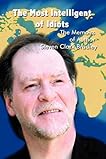
Click on the picture to learn more about
The Most Intelligent of Idiot
The Memoirs of Author Steven Clark Bradley
The Most Intelligent of idiots - The Memoirs of Author Steven Clark Bradley
The Patriot Acts Trilogy
Author Steven Clark Bradley
Steven Clark Bradley
FAN US ON GOODREADS:
Author Steven Clark Bradley on Goodreads
_______________________________
This is a Trap - The Second Republic - Patriot Acts Part II
(Click On Title Above Picture To Read Post)

A Stranger Just in Time
(Click On Title Above Picture To Read Post)

Get it at: http://www.writewordsinc.com/serepaacvo2...

What would America do if we were faced with a horrendous terrorist attack that no amount of security could stop?
In “The Second Republic – Patriot Acts Part II,” the President of the United States is confronted with a radical underground secret cabal that has targeted America with a domestic bio-terror attack that dwarfs the assault unleashed on September 11, 2001.
This second book in the Patriot Acts trilogy takes the reader inside the White House where treachery and terrorism boils below its underbelly. While trying to avoid invoking emergency powers that could destroy American constitutional freedoms, a former Special Ops officer, now the President of the United States, races to stop a deadly virus, which has killed thousands of innocent Americans.
This Fisher Harrison saga, The Second Republic, is an action thriller that could appear on any of today’s headlines, on any given day with a plausible scenario for the death of humankind that is too frighteningly conceivable for comfort.
When Too Much Security Can Kill You!
Steven Clark Bradley
Click Here To Read An Excerpt From
The Second Republic
______________________
Author Susan Whitfield Interviews with
Author Steven Clark Bradley
 On President's Day, What Do We Celebrate?
On President's Day, What Do We Celebrate?(Click On Title Above Picture To Read Post)

 My Definition of the the modern
My Definition of the the modern-Steven Clark Bradley
Four lessons For Willow Morgan
- Kassadia's Triumph
(Click On Title Above Picture To Read Post)
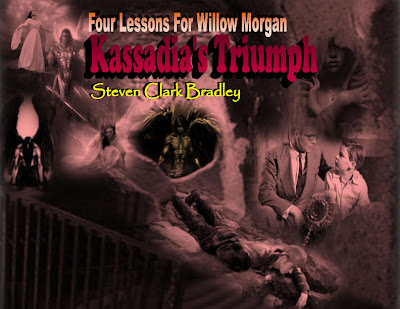
(Click On Title Above Picture To Read Post)
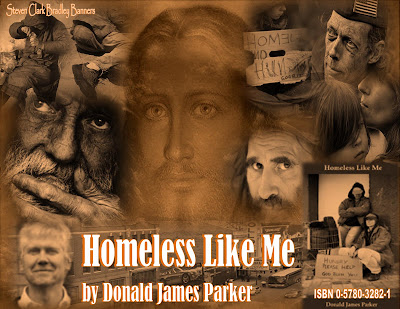
The Temples of Light
by Danielle Rama Hoffman
(Click On Title Above Picture To Read Post)
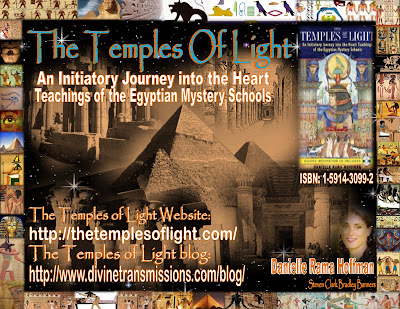
Four Lessons For Willow Morgan Part Two
The Preservation Of The Neph
(Click On Title Above Picture To Read Post)
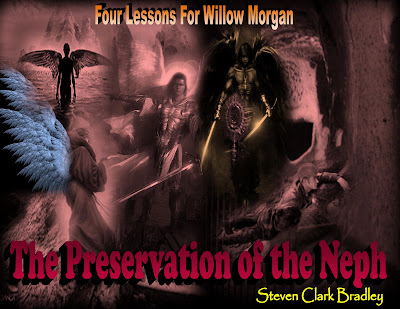 Four Lessons For Willow Morgan
Four Lessons For Willow Morgan 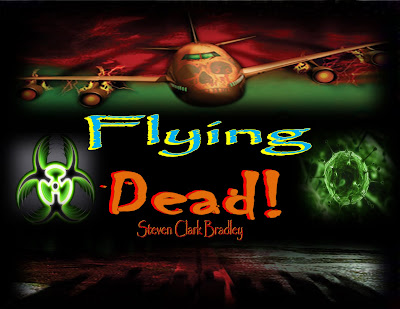
(Click On Title Above Picture To Read Post)
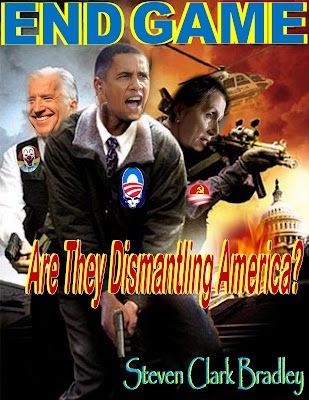
Healthcare That Will Make You Sick
Key Facts About Obama's Sick Health Reform
(Click On Title Above Picture To Read Post)

Obama's White House is Falling Down
(Click On Title Above Picture To Read Post)
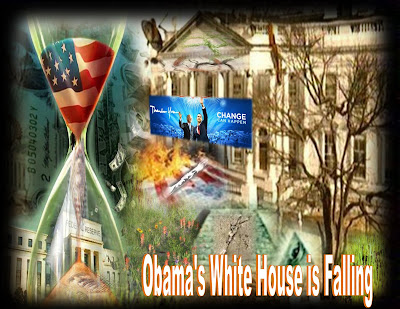 Is Barack Obama Just Another Jimmy Carter?
Is Barack Obama Just Another Jimmy Carter?(Click On Title Above Picture To Read Post)
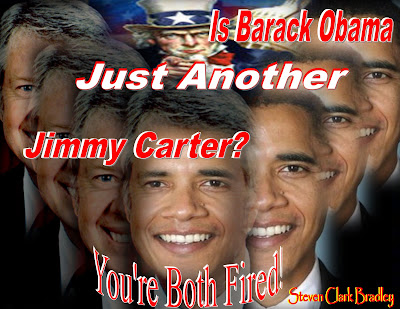 America's Condemner in Chief...
America's Condemner in Chief...(Click On Title Above Picture To Read Post)

Take A Look At The Dancing Valkyrie by Peter Kline
(Click On Title Above Picture To Read Post)

'More Deaths Than One' can Only Adequately Be Described As Superb
(Click On Title Above Picture To Read Post)

Beyond the Fifth Gate
(Click On Title Above Picture To Read Post)

Introducing - Retribution by M. Flagg
(Click On Title Above Picture To Read Post)

United In Hate by Jamie Glazov
Is A Veritable Treatise on Global Terrorism
(Click On Title Above Picture To Read Post)

Press Release - Cambridge Books Presents
Patriot Acts by Author, Steven Clark Bradley
(Click On Title Above Picture To Read Post)

So, How Do You Feel, Just Now?
(Click On Title Above Picture To Read Post)


(Click On Title Above Picture To Read Post)
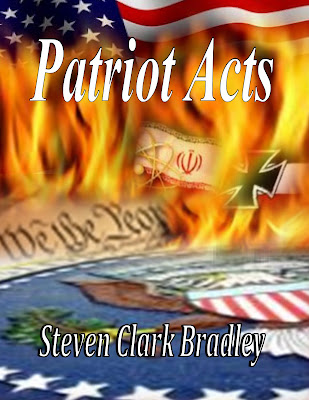



(Click On Title Above Picture To Read Post)


Blog: WOW! Women on Writing Blog (The Muffin) (Login to Add to MyJacketFlap)
JacketFlap tags: Joanne Hirase, Joanne Stacey, 2012: The Rising, December 21, Musa Publishing, Science Fiction, apocalypse, author interview, doomsday, Mayan calendar, Add a tag
If you have cable TV then you’ve probably heard that the end of the world is less than a week away. National Geographic and the History Channel are chock-full of shows preparing us for the impending apocalypse on December 21, 2012. While most of us busy ourselves with holiday shopping and getting ready for the New Year, isn’t there something in the back of your mind that makes you wonder if it’s all going to go down?
So pull up a chair, grab your favorite beverage, and join us for an intimate conversation as we find out more about Joanne’s debut novel!
2012: The Rising
by Joanne Hirase
Several ancient civilizations have predicted the end of the world on December 21, 2012, but Mac Carter doesn’t believe it will happen. He believes he’ll wake up on December 22 and the world will be the same. When he meets the mysterious Vareeda Shintuk, his beliefs are questioned. He struggles to resist her message about the great threat to humanity and his power to alter the fate of the universe, but her words are powerful and mesmerizing. As he puts together the horrifying truth, he discovers he is the key to a future for mankind.
Mac finds himself tangled in a chaotic double life of lies, deceit, and evil. He struggles to do the right thing, but will he succeed?
Publisher: Musa Publishing (December 14, 2012)
ISBN: 978-1-61937-321-1
ASIN: B00ANXFIOM
Word Count: 102,000
2012: The Rising is available as an e-book through Musa Publishing, Barnes & Noble, and Amazon.com.
WOW: Joanne, welcome to The Muffin. Ever since I’ve known you, I always thought you’d write a women’s fiction, mystery, or maybe even a children’s or YA novel . . . but science fiction? I never would’ve guessed it! What inspired you to write in this genre?
Joanne: My husband got hooked on Ancient Aliens and Histories Mysteries. He started telling me all about the 2012 theories, and concocted a book plot in detail. I took notes, and asked a lot of questions. He DVR’d all of the shows, told me which ones were relevant, sat me down in front of the television, and I caught the fever too!
WOW: Oh, that’s great. I love Ancient Aliens—especially the guy with the big hair! And I love that those shows are on the History Channel. So did you collaborate with your husband beyond that initial brainstorming session? Any tips for successful collaboration with a spouse?
Joanne: If I had questions or got stuck, my husband helped talk it out. We argued about a few things, and unfortunately he’s almost always right. (But don’t tell him I said that!) I had to walk away, think it through, and then have a rational conversation about the issue. We’re both strong personalities, so to successfully collaborate, we had to approach this the way we approach all decisions we make—with a lot of back and forth and give and take. The great thing about fiction is we can create the scene the way it makes us happy.
WOW: I remember my first serious boyfriend introduced me to the Mayan prophecies and how their calendar is set to end on December 21, 2012. I’ve been fascinated by the theories for years, and I can’t believe the date is almost here! Your book, 2012: The Rising, incorporates some of these theories. What is the most surprising thing you’ve learned about through your research?
Joanne: The most surprising thing I learned is that there are so many theories about December 21, 2012. I honestly didn’t know about anything other than the Mayan calendar, so when I started digging around, I couldn’t believe what I found! Now when I hear about a natural disaster or an asteroid passing close to Earth, it makes me think about the end of the world.
WOW: 2012: The Rising has a riveting plot, but at its core it’s a character-driven novel. The book contains several triangles—Mac, the protagonist, and his girlfriend Emma, and Mac’s best friend Rusty. Then there’s the beautiful and mysterious Vareeda . . . there’s a lot of tension and conflict! How did you go about forming the main characters in your book?
Joanne: I had an idea of what Mac would be like, and formed the other characters around him. I love the book First Draft in 30 Days, and used some of the worksheets to help me think the setting and characters through. Creating characters is one of my favorite parts of the writing process. I try living their life with all the hopes, fears, and doubts they experience, and it’s amazing how well I get to know them all.
WOW: Writers will be happy to know that your book started as a NaNoWriMo project. For those that are sitting on their rough drafts right now, what advice do you have for them when they pick up the red pen in January? (If we survive the apocalypse, of course! ;)
Joanne: Love what you wrote, but love your audience more! It’s painful to edit, but to keep your readers going, sometimes you have to delete those wonderful words. I redline using Track Changes and save my drafts just in case I want to bring something back. However, after I’ve cut scenes out, I’ve never put one back!
WOW: That’s great to know and makes me feel better about cutting. Okay, so I have to mention this marketing challenge you’re facing at the moment. Your book just came out last Friday, December 14, and your book is about the end of the world on December 21, 2012. That’s exactly one week to market it and make sales. Sure, you can sell books after the date, but the topic will be less timely. What are you doing to get the word out, and how can your fellow writers help?
Joanne: Besides the huge WOW! community that reads The Muffin, I’m blessed to have Dianna Graveman of 2 Rivers Communications & Design on my side. She is an amazing marketer, and is helping me create buzz. I’m getting a lot of compliments on my website that she built, and on my book trailer that Kim McDougal of Blazing Trailers made. Without Dianna and Kim, I’d be in a panic! Social media seems to be the best marketing tool, and fellow writers can help by retweeting, liking, and sharing!
WOW: I love your website and trailer! They did a great job. Have you seen National Geographic’s Doomsday Preppers show? I find it enthralling. Have you considered marketing to survivalists?
Joanne: I have seen Doomsday Preppers, and have actually been accused of being a prepper! I live on a mountain pass, and it would be hard for me to get to the store if something were to happen, so I have a fairly abundant food storage (for the dogs too!) We are reaching out to everyone that we think will be interested, because you just never know . . .
WOW: Thank you, Joanne, for taking the time to chat with us today! Please tell us what’s next for you.
Joanne: I have three sci-fi manuscripts in the works—one needs editing, and two need to be finished. I also have a mystery that I’ll start marketing again, plus three other manuscripts that need to be pulled out and reworked. Clearly, I’ve been writing for years, and to finally get published gives me that extra incentive to want to publish more!
WOW: Congratulations on your success! You’ve hooked me already. I can’t wait to read more from you.
Readers, find out more about Joanne by visiting her website www.JoanneHirase.com, following her on twitter @JHiraseStacey, and on facebook www.facebook.com/Author.Joanne.Hirase.
If you have a question for Joanne or want to talk about your end of the world theories, please leave a comment! :)
Blog: DRAWN! (Login to Add to MyJacketFlap)
JacketFlap tags: Apocalypse, Phil McAndrew, Calendar, Jaime Zollars, 2012, Adam Koford, Kali Ciesemier, Amy Crehore, Joe Lambert, David Huyck, Vincent Stall, Cloudy Collection, Luke Pearson, Emory Allen, Joe Alterio, endtimes, Ana Benaroya, King Mini, Add a tag
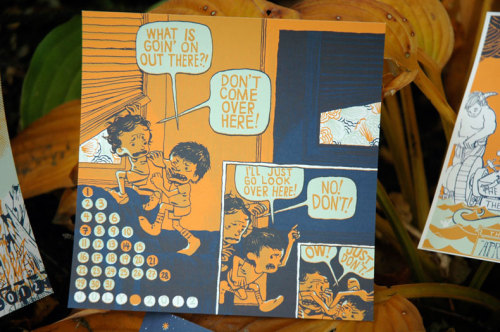
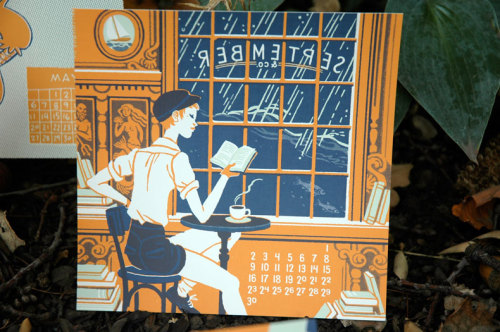

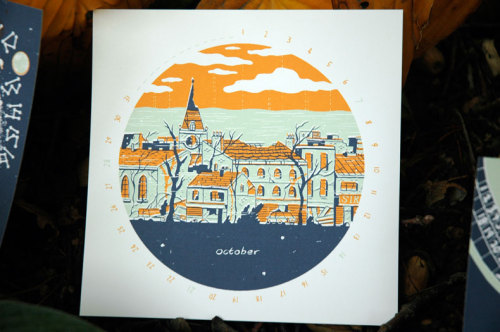
We had a fantastic time at the Cloudy Collection show at Minneapolis’s Pink Hobo Gallery, and the rest of the weekend at MIX was so much fun!
But like the fun weekend, all good things must end. So instead of moping, we’re excited to release our celebration of the endtimes in our 2012 Calendar of the Impending Apocalypse. Each month was made by a different artist - January through December were made by Phil McAndrew, Jaime Zollars, Ana Benaroya, Joe Alterio, Adam Koford, Vincent Stall, Joe Lambert, David Huyck, Kali Ciesemier, Luke Pearson, Emory Allen, and Amy Crehore, repectively. Check them out!
(via Cloudy Collection / Print Editions)
Blog: Litland.com Reviews! (Login to Add to MyJacketFlap)
JacketFlap tags: ya, young adult, war, young adults, teaching, teen, review, science fiction, reading, family, kids, literature, fiction, ethics, God, teens, children's books, book reviews, books, Uncategorized, adventure, book, children's, character, homeschooling, apocalypse, classroom, children's lit, book club, sci fi, android, artificial intelligence, Bernard Beckett, apocalyptic, advanced reader interest, Summer/vacation reading, ethics/morality, teachers/librarians, science or nature, Adam & Eve, philosophy, homeschool, evil, evolution, creation, novella, post-apocalyptic, morals, good, intellectual, Genesis, consciousness, intelligence, Original sin, Quercus, man-made, Add a tag
 Beckett, Bernard. (2006) Genesis. London: Quercus Publishing. ISBN 978-1-84724-930-2. Author age: young adult. Litland recommends age 14+.
Beckett, Bernard. (2006) Genesis. London: Quercus Publishing. ISBN 978-1-84724-930-2. Author age: young adult. Litland recommends age 14+.
Publisher’s description:
The island Republic has emerged from a ruined world. Its citizens are safe but not free. Until a man named Adam Forde rescues a girl from the sea. Fourteen-year-old Anax thinks she knows her history. She’d better. She’s sat facing three Examiners and her five-hour examination has just begun. The subject is close to her heart: Adam Forde, her long-dead hero. In a series of startling twists, Anax discovers new things about Adam and her people that question everything she holds sacred. But why is the Academy allowing her to open up the enigma at its heart? Bernard Beckett has written a strikingly original novel that weaves dazzling ideas into a truly moving story about a young girl on the brink of her future.
Our thoughts:
Irregardless of whether you are an evolutionist or creationist, if you like intellectual sci-fi you’ll love this book. How refreshing to read a story free from hidden agendas and attempts to indoctrinate its reader into a politically-correct mindset. And while set in a post-apocalyptic era, the world portrayed is one in which inhabitants have been freed from the very things that sets humans apart from all other creation, including man-made. Once engulfed in the story, the reader is drawn into an intellectual battle over this “difference” between man and man-made intelligence. The will to kill; the existence of evil. A new look at original sin. And a plot twist at the end that shifts the paradigm of the entire story.
Borrowing from the American movie rating scale, this story would be a PG. Just a few instances of profanity, it is a thought-provoking read intended for mature readers already established in their values and beliefs, and who would not make the error of interpreting the story to hold any religious metaphors. The “myth” of Adam and Art, original sin and the genesis of this new world is merely a structure familiar to readers, not a message. The reader is then free to fully imagine this new world without the constraints of their own real life while still within the constraints of their own value system.
Genesis is moderately short but very quick paced, and hard to put down once you’ve started! Thus it is not surprising to see the accolades and awards accumulated by Beckett’s book. The author, a New Zealand high school teacher instructing in Drama, English and Mathematics, completed a fellowship study on DNA mutations as well. This combination of strengths gives Genesis its intrigue as well as complexity. Yet it is never too theoretical as to exclude its reader. See our review against character education criteria at Litland.com’s teen book review section. And pick up your own copy in our bookstore!
Blog: OUPblog (Login to Add to MyJacketFlap)
JacketFlap tags: Religion, apocalypse, jesus, oprah, christian, warcraft, World of Warcraft, Leisure, end of the world, parking, doomsday, rapture, the end is near, apocalyptic, second coming, linked up, *Featured, Family Radio, Harold Camping, may 21, apocamix, Add a tag
It was the best of times…it was the end of times.
 Perhaps you haven’t heard, but the world will end tomorrow. That is, according to Harold Camping and the “Family Radio” network, who have been warning us that the rapture will take place at 6 p.m. on May 21st. (I am still unsure…is this for Eastern Daylight Time? Or will it just begin in New Zealand and sweep west?)
Perhaps you haven’t heard, but the world will end tomorrow. That is, according to Harold Camping and the “Family Radio” network, who have been warning us that the rapture will take place at 6 p.m. on May 21st. (I am still unsure…is this for Eastern Daylight Time? Or will it just begin in New Zealand and sweep west?)
I wouldn’t want you all to just be sitting around, bored and waiting, so I’ve come up with a few things you can do in the meantime.
Google ‘rapture’ and watch the realtime results counter. (Is there a rapture countdown widget? I haven’t been able to find one.)
Play World of Warcraft. Go ahead. Here’s why your gaming skills will help you survive.
Try to figure out what the heck Blondie’s singing about in “Rapture.”
Read New York City’s Mayor Bloomberg shares 5 reasons the world can’t end. Yet.
Jump for joy, because if the world ends, so does alternate-side parking.
Remember that the real doomsday is coming: the end of the Oprah Winfrey Show.
Figure out the difference between the rapture and the second coming of Christ.
Catch up with this last-minute rapture reading list. (To which I would like to add Apocalyptic AI.)
Prepare a Rapture Party.
Get your groove on to the Eclectic Method’s “Apocamix.”
Buy the large popcorn at the movies (with EXTRA butter) and don’t even bother flossing.
0 Comments on Linked Up: Possible end of the world edition as of 1/1/1900
Blog: The Mumpsimus (Login to Add to MyJacketFlap)
JacketFlap tags: dystopia, Theatre, Cheney publications, apocalypse, Tor.com, Tor Books, Caryl Churchill, Add a tag
The good people at Tor.com asked me to contribute a post about the playwright Caryl Churchill for Dystopia Week, and I was thrilled to be able to oblige them with "Dystopia on Stage: Caryl Churchill's Far Away".
Here's a taste:
Most people don’t often think of playwrights as science fiction and fantasy writers, and SF doesn’t really exist as a genre in the theatre world in the same way it does in the world of print and cinema. Yet from its earliest incarnations, theatre has reveled in the fantastic, and many of the greatest plays of all time have eschewed pure realism. Something about the relationship between performers and audiences lends itself to fantasy.Continue reading...
The British playwright Caryl Churchill has written a great number of extraordinary plays, many of them enlivened by impossible events. Churchill is a staunchly political writer, a writer who seeks to challenge audiences’ complacencies about the real life of the real world, but flights of imagination give resonance to her unblinking view of reality’s horrors, using the unreal to probe the deep grammar of reality.
Blog: OUPblog (Login to Add to MyJacketFlap)
JacketFlap tags: disaster, flood, Naked City, Sharon Zukin, moma, Chilean miners, china, Sociology, Politics, environment, apocalypse, Kansas, Geography, Featured, Add a tag
By Sharon Zukin
The world’s biggest cities often spawn disaster scenarios—those end-of-the-world, escape-from-New-York exaggerations of urban dystopia. Once limited to printed texts and paintings, visions of urban apocalypse have become ever more accessible in newspaper photographs, movies and video games. They form a collective urban imaginary, shaping the dark side of local identity and civic pride.
New York is especially attractive as a site of imagined disaster. Maybe it’s payback for the city’s hubris and chutzpah, or perhaps there’s something in the American character that yearns for and fears creative destruction. If there is a general hunger for destruction stories, it is fed by the knowledge that the cities we build are vulnerable. The terrorists’ attacks on the World Trade Center and the Pentagon in 2001 brought this point home to Americans, renewing dormant anxiety about nuclear war and environmental disaster.
But what if the city’s built environment suffers from slow erosion rather than a single cataclysm like Hurricane Katrina? Can we visualize the slow creep of problems as well as we imagine the sudden onset of disaster and summon the will to change course?
“Rising Currents,” a recent exhibition at the Museum of Modern Art, pitted five teams of architects, engineers and urban designers against a gradual but dramatic rise in sea level resulting from global climate change. The challenge: to retrofit the city’s waterfront to survive and prosper after a new Flood.
Cities have a troubled history with water. From building walls around wells in ancient deserts to colonizing rivers for the expansion of trade, human settlements have worn down maritime nature with a steady ooze of cement. Building dams in the West of the United States, India and China, crowding cities near the Danube River in Eastern Europe, throwing landfill into Hong Kong’s Victoria Harbor as well as into New York Bay: all of these have reduced water resources to serve human needs.
Global cities, those capitals of capital, are the biggest offenders. As one of the architectural teams engaged in the MoMA exhibition points out, two piers built for oil depots on the New Jersey side of the Hudson River are each two miles long—as long as the Twin Towers of the old World Trade Center were high.
What’s most impressive about a rising water level is the sense that nature is taking back from the human world. And what’s most impressive about the architectural projects in “Rising Currents” is the sensibility that human survival depends on adaptation rather than pacification.
There are good ideas here. The keywords are conservation, production and conversion: creating a transportation network of ferry boats rather than cars and buses, developing oyster beds off the Brooklyn shore, reshaping fuel depots to use less land. But how can a city government—one whose modest plans for renovating parkland are constantly plagued by cost overruns and delays—undertake these projects?
Privatization is not the answer. Only a state can coordinate long-term efforts to rebuild for urban survival. The recent rescue of the Chilean miners from their underground prison suggests to some people that a non-governmental mobilization of global resources can be successful against great odds. In that case, though, individuals, industries and governments united around one clear goal. To rebuild the waterfront, many conflicts of interest would h
Blog: OUPblog (Login to Add to MyJacketFlap)
JacketFlap tags: Film, Religion, apocalypse, A-Featured, A-Editor's Picks, cory doctorow, cherie priest, Apocalyptic AI, 2001: a space odyssey, death to humans, lord of the rings, warcraft, World of Warcraft, scientific american, the matrix, stanley kubrick, Manhattan College, apocalyptic, geraci, priest’s, Literature, Add a tag
Read his previous post, 10 Ways World of Warcraft Will Help You Survive the End of Humanity!
By Robert M. Geraci
Scientific American recently rocked the Internet with its editors’ piece “Death to Humans! Visions of the Apocalypse in Movies and Literature” but, in doing so, have missed half of the fun. In an article where the sublime (The Matrix) meets the atrocious (The Postman), the chief problem that SciAm’s editors suffer is that, to be honest, they do not know what an apocalypse is.
Threats to the world are not apocalyptic. In one of the apocalyptic texts par excellence, the Book of Revelation, the world isn’t just going to end…it’s going to transform in radical fashion (admittedly thanks to the seven seals that FBI and ATF members thought were marine mammals when David Koresh quoted them, the many-headed beast, and the whore of Babylon who will be drunk on the blood of the martyrs). Despite all the trials and tribulations, the end of the world is a good thing: it will end with the establishment of a wondrous new one.
So, how about some more apocalyptic films and books?
R.U.R. (1927; play) – Robots plan on killing us all. But after they’ve finished their noble work, they will explore an earth purged of, umm, us.
2001: A Space Odyssey (1968; film and novel) – In Kubrick’s and Clarke’s classic, David Bowman gets sucked into a galactic hotel and comes back a “Star Child” who can toss aside nuclear weapons as though they are paper airplanes. A new world shall dawn in the warm glow of the cosmic baby’s power.
Dark City (1998, film) – After John Murdoch psychokinetically conquers the aliens who have enslaved humankind, he remains stuck in a spaceship but uses its powers to provide himself with a West coast paradise where he will spend the future with a lovely woman whose memories have been tailored to match his own.
The Lord of the Rings (1954-1955 and 2001-2003; novels and films) – When two hobbits (one deranged and well past his prime, the other just twisted and tired after a noble quest) struggle at the flaming precipice of Mount Doom, they inaugurate a new world. In the end, lava purges the forces of evil and the friendly hobbits have a fighting chance to spend eternity blowing smoke rings and cheering for fireworks.
Down and Out in the Magic Kingdom (2004; novel) – Cory Doctorow paints us a future where we can spend an infinity in Disney Land, rejuvenating our bodies and, when necessary, restoring our minds to cloned bodies in the case of, well, an accident. And the line at the Pirates of the Caribbean ride won’t matter because you have an infinite amount of time to wait.
Accelerando (2006; novel) – After the machines take over the solar system, predicts Charles Stross, we can always ask a divine
Blog: Sugar Frosted Goodness (Login to Add to MyJacketFlap)
JacketFlap tags: apocalypse, Anne Kelley, velociraptor, Shirt.Woot, Add a tag
Blog: Aspiring Editor and Geek to the Core (Login to Add to MyJacketFlap)
JacketFlap tags: book reviews, man, son, apocalypse, McCarthy, The Road, bad guy, good guy, Add a tag
 The Road by Cormac McCarthy left me devastated and depressed, but in a way that was acceptable. It was a horror story of what may come without the creepy crawlies and bogeymen.
The Road by Cormac McCarthy left me devastated and depressed, but in a way that was acceptable. It was a horror story of what may come without the creepy crawlies and bogeymen.
I had the pleasure (?) to read this story not knowing a single thing about it. I had read no synopsis, nor had I heard anything specific about it from any friends or colleagues. I had simply heard of it often enough to know it was a worthy read.
And boy, was it! At first it seemed to move at a slow pace, but I was intrigued by the language and style of it. I had never read anything written quite like this before. McCarthy's lack of quotation marks and non-use of names had me reading whenever I got a chance. I couldn't put it down. Literally. I finished a good chunk of it in the first sitting and I was itching to pick it up again and disappointed each night when I couldn't keep myself awake long enough to read more.
The horrors in the book weren't so much horrifying as chilling. The "bad guys" were never explained in any manner besides being bad guys. The good guys did some gruesome things, but never as bad as the bad guys. The good guys did what they had to in order to get by, but the bad guys did terrible things to children and anything that crossed their paths. Or so it would seem from the brief conversations between the man and the son. No explanation was ever given for why the world was the way it was. No explanation of why the good guys who carried the fire were going down south except for the fact they wanted to keep warm. Not even any real explanation as to when this apocalypse came to be.
Lately I seem to have fallen into a rut of reading books that are depressing. I've read books from the minds of serial killers, first time killers, people trying to escape Big Brother, and others that left me feeling down-right depressed. This book trumped all those. It addressed issues I never would have thought of on my own. What would you do if you had a child in a time where there was no food or shelter for anyone? Where the bad guys were constantly after you? Where there was no break from the cold? Where the life you once knew would never be again? Where you had stories you could share from your childhood with your child but he would never understand such happiness and ease? What would anyone do? Would you be a good guy? Or a bad guy?
Blog: ART JUMBLE Blog (Login to Add to MyJacketFlap)
JacketFlap tags: comics, zombies, apocalypse, cover, Chogrin, Awakening, pin-up, volume 2, alex eckman-lawn, Nick Tapalanasky, Add a tag
Blog: OUPblog (Login to Add to MyJacketFlap)
JacketFlap tags: Links, blog, Blogs, apocalypse, A-Featured, forecast, friday, museums, delete, collages, calories, victorians, scientifically, Add a tag
Happy Friday to everyone and congratulations for making it through a rather rainy and dreary week. Friday is here, there is sun in the forecast and hopefully a return of spring weather. Enjoy the links below and I’ll see you all on Monday.
Who knew? The Victorians made great collages.
A guide to free museums in NYC.
Speaking of museums, the Museum of Scientifically Accurate Fabric Brain Art.
Does poetry matter?
Which governments ask Google to delete information the most often?
Don’t underestimate the value of that sugar pill.
How one ultra-runner gets enough calories.
The coming Shakespeare apocalypse.
What does “off-the-record” really mean?
An argument for attending grad school during a recession.
Blog: OUPblog (Login to Add to MyJacketFlap)
JacketFlap tags: fiction, The, College, 80, Manhattan, Robert, Geraci, Rokk, level, sci, fi, Life, science fiction, robots, Technology, Science, apocalypse, A-Featured, Western Religion, World, of, aliens, Warcraft, Second Life, World of Warcraft, Leisure, sci fi, Second, AI, Apocalyptic AI, level 80, Manhattan College, Robert Geraci, skynet, The Rokk, Apocalyptic, Add a tag
Lauren Appelwick, Publicity
Robert M. Geraci is Assistant Professor of Religious Studies at Manhattan College. In his new book Apocalyptic AI: Visions of Heaven in Robotics, Artificial Intelligence, and Virtual Reality, he examines the “cyber-theology” which suggests we might one day upload our minds into robots or cyberspace and live forever. Drawing on interviews with roboticists, AI researchers, Second Life devotees, and others, Geraci reveals that the idea of Apocalyptic AI is strikingly similar to Judeo-Christian apocalyptic traditions. Here, he shares 10 ways World of Warcraft, one virtual reality game, could help us survive the end of the world as we know it.
1. The dangers will be minimal…level 80 priests can provide universal health care.
President Obama plans to insure 32 million more Americans than are currently protected; but the area of effect healing spells of priests can jump from one person to another, healing them as they become sick and injured without need for hospital visits, insurance payments, etc. This approach to medical treatment has obvious benefits over the constant paperwork that federally mandated insurance will require.
2. When aliens come to take over the planet, they’ll get addicted to WoW and forget what they were doing.
Instead of world domination, aliens will hope to complete all four daily cooking quests for The Rokk. After they’ve already eaten Emeril, they’ll spice up their life with Super Hot Stew and realize that people don’t taste all that good after all.
3. Who needs indoor plumbing? You’re already used to peeing into bottles.
Your guild’s “friendly” three day race to level 80 has given you all the continence you need…and the willingness to do what you must when the time comes.
4. After countless hours of farming for minerals, herbs and animal hides, you’re well prepared for life after subprime mortgages collapse the economy.
Let’s face it, the economy is in shambles and no one knows when it will recover. On the other hand, while toxic mortgage securities provide neither housing nor security, a proper skinner can ensure that all the local children stay warm through the winter.
5. Gnomish engineers will program the robots to like you (though they can’t guarantee proper functioning).
It’s not the Gnomes’ fault that Skynet became self-aware…they didn’t think it would defend that off switch so vociferously! And to compensate, they’ll happily upload your mind into one of their inventions so that you can join the robots in their post-apocalyptic future.
6. As the value of the dollar declines, gold and mithril will remain safe investments.
Gold will shine through the darkest of times and foreign governments will always be content to buy it from you at the auction house.
7. Your family pet can take aggro for you while you lay a fire trap to destroy a zombie mob.
A lifetime of treats and petting repaid in one priceless moment.
8. Your potions of underwater breathing will let you grab the a
Blog: Rodents Of Unusual Size (Login to Add to MyJacketFlap)
JacketFlap tags: Work, Apocalypse, Disasters, Add a tag
Life - My how things can change overnight! Last night Maine got hit with a pretty gnarly winter storm, though quite unlike the storms most of the rest of the East coast has been getting. Instead of snow, we got inches of rain and winds. Oh the winds! Sometimes exceeding 90 miles an hour, the trees behind the Northeastern Motel, (The crummiest little motel in the east) were whipping back and
Blog: Dejah View Book Review (Login to Add to MyJacketFlap)
JacketFlap tags: apocalypse, future, If you liked Uglies..., If you liked His Dark Materials..., lead female, Add a tag

Suzanne Collin (author of the "Gregor" series) hits it out of the ball park with THe Hunger Games. First in a series of three, this novel has gotten nothing but rave reviews and for good reason: it will hook you in and leave you craving more. In a futuristic post-apocalyptic world (don't the best ones seem to start that way?) there are 13 districts rippling out from the Capitol; and in order to mark the failed uprising of the 13th district, the Capitol holds the immensely popular Hunger Games. Each year two tributes from each District are chosen to compete to the death in a staged arena until only one victor emerges. Did I mention that the tributes are children? But of course. Because how best to perpetually punish a botched rebellion and keep people under the Thumb than by killing off their children? Sick? Totally. Disturbing? Absolutely. WIll you be able to put it down? Not a chance.
Imagine "American Idol" meets "Gladiators". The tributes are cast into a spotlight that echos the bustle of starlets in Hollywood, are filmed at every moment, are watched by every citizen. Main character Katniss is strong and savvy, Peta is kind and constant; both come from the shambles of District 12 and must fight to stay alive in the Hunger Games arena. But the methods they use will have the Capitol panicked and the populace rioting.
Believe the buzz. It's a great read for young adults and grown-ups alike. You'll be reaching for the sequel withint days.
Blog: Time Machine, Three Trips: Where Would You Go? (Login to Add to MyJacketFlap)
JacketFlap tags: health, zombies, Apocalypse, salt, demons, supernatural, End of the world, hypertension, Offbeat, Iodine, sodium, zombieland, Mental retardation, survive, Add a tag
For the Mayans, 2012 is the end of their calendar… and maybe the end of the world. I don’t know about you, but I’ve heard apocalyptic predictions throughout much of my life. Remember the millennium? Y2K? The Great Zombies Uprising?
Well, whatever you believe… apocalypse or not… there’s no harm in making sure you’re all set in case the worst happens. Isn’t the Boy Scouts’ motto “Always Be Prepared”?
SALT! I cannot impress upon you how important salt is. Okay, so maybe your doctor says it’s giving you high blood pressure right now. But that’s because you’re using too much of it (salt is already in most foods, therefore it’s not necessary to add more).
Fact is, salt is actually vital for you. Salt regulates the water in your body. A sodium deficiency can lead to seizures; even cause you to fall into a coma.
Image via Wikipedia
Salt’s even been used in place of currency. In fact, the word “salary” comes from the word salt. And perhaps you’ve heard the saying “worth his weight in salt”. Yep. Salt was a real comparison of worth because of its high value.
One of the main health necessities of salt is due to its iodine. Years back they started putting iodine in salt, a small but essential amount that keeps us from Iodine Deficiency. This lack of iodine is pretty serious. It can lead to mental retardation. (Worldwide, Iodine Deficiency effect 2 billion people)
Image via Wikipedia
Salt is a great preservative. Once we lose electricity, we lose refrigeration. Salt may be the only way you will be able to keep your meats for any length of time.
Plus, rumor has it salt can help you fight off demons. If the religious nuts are right and the apocalypse comes by way of Lucifer, than that’s just one more reason why you should have plenty of salt on hand.
So, bottom line: Salt is cheap. If you’re smart, you’ll start stocking up your cupboards now with this white, grainy gold.
Image via Wikipedia
Blog: Time Machine, Three Trips: Where Would You Go? (Login to Add to MyJacketFlap)
JacketFlap tags: zombies, sad, swords, water, tragedy, Pick, populace, smach, spray, surviving, weapon, blow, flammable, hard, Lock, Food, Apocalypse, age, car, death, old, door, drive, guns, break, infected, Look, head, kill, matches, Nail, forks, Offbeat, knives, hammer, damage, Add a tag
To survive a zombie apocalypse you have to be very brave and stupid. Stupid by actually trying to, I mean the whole world is basically against you now. Your going to have to be fit and athletic. You also need to have good aim. If you fit this description then your story begins…
Chapter 1
When a zombie apocalypse first happens, this is the most dangerous part. Many people are going to get infected because they don’t know what the hell is happening. Now you probably don’t care about the other people but the more of them that get infected the worse it is for you. For now all you need is a weapon.
If your in an office or a business area (this includes hotels, hospitals, etc) your going to have to use your fists. But really your going to run most of the time. If your nearer to the top floor do not go down the stairs UNLESS you have a weapon. It is really dangerous to go down there, you will get cornered no matter how tough you are. Though you’re going to have to get out before it gets any worse. To get a weapon try going to a janitor closest. If your no where near there go into any office and grab a keyboard, chair, anything light and gives you the ability to crack a head in one hit. Now if you are near a janitor closet go in and grab a mop and some spray, make sure the spray is flammable. If you have a lighter then you have an advantage. Matches will work too. Now you need the spray for 2 things, some idiots lock doors that you need to get through and hell no they won’t let you in. Just spray the lock and light it up. I’d hide behind something just in case it blows. If you don’t have any thing to light it up all you need is a plastic Id card and try to pick the lock. This is very easy actually. All you do is try to place the card between the lock and the wall, the door will slide open. If your running out of time, try to break the handle of the door. If all else fails try another door, in an office building they probably have an emergency exit. If the exit is over run by zombies you now have a weapon so you may now go to the stairs! Just be careful, use your mop to knock the zombies down the stairs. If your mop breaks, which might happen if you hit with it too hard, then use the longest end and use it as a spear. Aim for the head or just push em off the stairs. Once you reach the bottom floor avoid the exits until you make a distraction. If you have a lighter or matches then you have a distraction. Go to any hall away from the exits and spray a lot of fluid on the floor. Once the floor is wet smear the can in the fluid. Make sure your hands are not wet and there are no zombies around, then use your matches on the fluid before it dries and run to an exit ( try to hide behind something before you get close to the exit to make sure no zombies are around. The spray can will eventually explode, if you sprayed enough fluid on the floor. If you didn’t just make sure no zombies are around and run to the exit. If the can explodes a lot of zombies will come, now you can just run to the exits while they are checking out what blew up. Now if you don’t have matches just make a run for the exit. Continue on chapter 2.
Now if your in a house or you were shopping (this includes restaurants, malls, apartments) then just lock all the doors leading in to the building. If you encounter a zombie on your way to lock the doors in a shop, run to any aisle with tools or anything sharp. Once there grab it and try to smash its head. Be careful not to get bitten. In the store you will encounter other people that will probably help you out. If your in your house then you’re safe for now since you already have your doors locked..I hope. If your at this step you can just skip to chapter 3.
Chapter 2
If you were on the road, in a car or was just taking a walk when this happened then all you need to do is get to the nearest police department. If you just escaped from you office building or business area then you need to get to a car since the nearest police department is no where near you. If you were walking get the hell back to your car or house if your walking the dog. Anyway once your in a car go to the police department. If it’s over run or they won’t let you in then drive out of the city or the popular parts of town to the suburbs or any where that’s not as populace. You can then just find a small store or pharmacy. A pharmacy would be best. Once you find one that’s not over run go in and lock ALL doors. Not one should be left open. If the doors are broken seal them with grocery carts. If you can’t find any, get anything like empty boxes or useless items like signs and billboards and pile them on the exit. Once you completely sealed all exits you can rest.
Chapter 3
If you were the person that ran out of the office then you need to regain your energy, eat some food or candy that you can find in the store and sleep you will probably of already slept by then. Just don’t eat to much candy and drink a lot of water. If you were already in the store or house and you completely sealed off all entrances and exits you don’t need rest, you need weapons. For now you can hold off on weapons since security and protection is more important. Try wearing a plastic rain coat if you have any and wear thick boots and pants, put on some gloves and test biting yourself, if the glove gets ripped it wont help you against the zombies. If you are in a store that has no clothes then make yourself some weapons. Knives are usually sold at food stores and flammable stuff like disinfectant spray are usually there too. But if your gong to use the spray then head to the aisle with matches, the bigger the better. Then just get empty boxes and billboard signs and seal off the entrance to the food aisle, just in case the zombies breach the doors. Though you better get a lot of water and food in your aisle before you seal it off. If there is a pharmacy or a drug aisle in the store get some pain relievers and any useful drug that might help in the future, probably a cream that disinfects cuts and scrapes.
Chapter 4
Friends and family at the most part are probably dead, if they are not following this guide that is, so you you going to need somebody to help you out. If you were stuck in the store you probably already have people that are nagging at you. If your home alone or you were the person from the office and is in a store now you don’t really need help from anybody else you can skip to chapter 5. Now if you do have people the are willing to join you then your first going to have to share your supplies. This is fine because more people adds to your defences and brain power. Just give a knife or if they have good aim give em a few to throw them at zombie heads. But watch your back one of those knives might be planned for you…
Chapter 5
Your food supplies are probably getting low if you are at home. If your in an apartment building and need to escape go back to chapter 1. Now if your in a house then you might have a chance… If your house has a chimney then this is a possible exit. Just make sure you can fit. If you can’t or if your afraid of tight places head to the Attic and open a window. Try to climb up to the room using your window sill as a foot hold. If it’s too high, then try using another window. If you actually have a car then go back to chapter 2. Don’t forget your weapons. If you don’t know what weapons to use go to chapter 6.
Chapter 6
Weapons are a crucial part to surviving. Many things can be weapons. If you have a car you can just run over zombies no problem. If your at home a nail gun, hammer (If your actually gonna use a hammer make sure you have 2 since they are slow to hit with) mop, broom, keyboard, flammable spray, matches, knives and forks. For the forks you can throw them like darts, though your going to have to be a good aim and throw it hard enough to make any damage. If your at an office or hotel weapons like brooms, keyboards, flammable spray, matches, will work just fine. If your at a food store use anything like carts or knives. If your in a super center or a tool store you don’t really need help finding a weapon, they are every where!
Chapter 7
Surviving for a long time is hard and probably won’t be accomplished since your probably gonna get nuked. Your friends might turn on you or you starve or thirst to death. The only possible way of surviving is if you have a helicopter, gas, guns, food factory, water from a river with filter, and a mansion with steel walls and gates. Even if you have that stuff you will eventually die of old age anyway. It’s a horrible and sad tragedy that you will endure if you ever have to go through a zombie apocalypse. A zombie apocalypse might never happen but i could always be wrong…
Blog: Time Machine, Three Trips: Where Would You Go? (Login to Add to MyJacketFlap)
JacketFlap tags: Food, zombies, Apocalypse, age, car, sad, death, swords, old, door, drive, water, guns, break, infected, Look, head, kill, matches, Nail, forks, tragedy, Offbeat, knives, hammer, damage, blow, flammable, hard, Lock, Pick, populace, smach, spray, surviving, weapon, Add a tag
To survive a zombie apocalypse you have to be very brave and stupid. Stupid by actually trying to, I mean the whole world is basically against you now. Your going to have to be fit and athletic. You also need to have good aim. If you fit this description then your story begins…
Chapter 1
When a zombie apocalypse first happens, this is the most dangerous part. Many people are going to get infected because they don’t know what the hell is happening. Now you probably don’t care about the other people but the more of them that get infected the worse it is for you. For now all you need is a weapon.
If your in an office or a business area (this includes hotels, hospitals, etc) your going to have to use your fists. But really your going to run most of the time. If your nearer to the top floor do not go down the stairs UNLESS you have a weapon. It is really dangerous to go down there, you will get cornered no matter how tough you are. Though you’re going to have to get out before it gets any worse. To get a weapon try going to a janitor closest. If your no where near there go into any office and grab a keyboard, chair, anything light and gives you the ability to crack a head in one hit. Now if you are near a janitor closet go in and grab a mop and some spray, make sure the spray is flammable. If you have a lighter then you have an advantage. Matches will work too. Now you need the spray for 2 things, some idiots lock doors that you need to get through and hell no they won’t let you in. Just spray the lock and light it up. I’d hide behind something just in case it blows. If you don’t have any thing to light it up all you need is a plastic Id card and try to pick the lock. This is very easy actually. All you do is try to place the card between the lock and the wall, the door will slide open. If your running out of time, try to break the handle of the door. If all else fails try another door, in an office building they probably have an emergency exit. If the exit is over run by zombies you now have a weapon so you may now go to the stairs! Just be careful, use your mop to knock the zombies down the stairs. If your mop breaks, which might happen if you hit with it too hard, then use the longest end and use it as a spear. Aim for the head or just push em off the stairs. Once you reach the bottom floor avoid the exits until you make a distraction. If you have a lighter or matches then you have a distraction. Go to any hall away from the exits and spray a lot of fluid on the floor. Once the floor is wet smear the can in the fluid. Make sure your hands are not wet and there are no zombies around, then use your matches on the fluid before it dries and run to an exit ( try to hide behind something before you get close to the exit to make sure no zombies are around. The spray can will eventually explode, if you sprayed enough fluid on the floor. If you didn’t just make sure no zombies are around and run to the exit. If the can explodes a lot of zombies will come, now you can just run to the exits while they are checking out what blew up. Now if you don’t have matches just make a run for the exit. Continue on chapter 2.
Now if your in a house or you were shopping (this includes restaurants, malls, apartments) then just lock all the doors leading in to the building. If you encounter a zombie on your way to lock the doors in a shop, run to any aisle with tools or anything sharp. Once there grab it and try to smash its head. Be careful not to get bitten. In the store you will encounter other people that will probably help you out. If your in your house then you’re safe for now since you already have your doors locked..I hope. If your at this step you can just skip to chapter 3.
Chapter 2
If you were on the road, in a car or was just taking a walk when this happened then all you need to do is get to the nearest police department. If you just escaped from you office building or business area then you need to get to a car since the nearest police department is no where near you. If you were walking get the hell back to your car or house if your walking the dog. Anyway once your in a car go to the police department. If it’s over run or they won’t let you in then drive out of the city or the popular parts of town to the suburbs or any where that’s not as populace. You can then just find a small store or pharmacy. A pharmacy would be best. Once you find one that’s not over run go in and lock ALL doors. Not one should be left open. If the doors are broken seal them with grocery carts. If you can’t find any, get anything like empty boxes or useless items like signs and billboards and pile them on the exit. Once you completely sealed all exits you can rest.
Chapter 3
If you were the person that ran out of the office then you need to regain your energy, eat some food or candy that you can find in the store and sleep you will probably of already slept by then. Just don’t eat to much candy and drink a lot of water. If you were already in the store or house and you completely sealed off all entrances and exits you don’t need rest, you need weapons. For now you can hold off on weapons since security and protection is more important. Try wearing a plastic rain coat if you have any and wear thick boots and pants, put on some gloves and test biting yourself, if the glove gets ripped it wont help you against the zombies. If you are in a store that has no clothes then make yourself some weapons. Knives are usually sold at food stores and flammable stuff like disinfectant spray are usually there too. But if your gong to use the spray then head to the aisle with matches, the bigger the better. Then just get empty boxes and billboard signs and seal off the entrance to the food aisle, just in case the zombies breach the doors. Though you better get a lot of water and food in your aisle before you seal it off. If there is a pharmacy or a drug aisle in the store get some pain relievers and any useful drug that might help in the future, probably a cream that disinfects cuts and scrapes.
Chapter 4
Friends and family at the most part are probably dead, if they are not following this guide that is, so you you going to need somebody to help you out. If you were stuck in the store you probably already have people that are nagging at you. If your home alone or you were the person from the office and is in a store now you don’t really need help from anybody else you can skip to chapter 5. Now if you do have people the are willing to join you then your first going to have to share your supplies. This is fine because more people adds to your defences and brain power. Just give a knife or if they have good aim give em a few to throw them at zombie heads. But watch your back one of those knives might be planned for you…
Chapter 5
Your food supplies are probably getting low if you are at home. If your in an apartment building and need to escape go back to chapter 1. Now if your in a house then you might have a chance… If your house has a chimney then this is a possible exit. Just make sure you can fit. If you can’t or if your afraid of tight places head to the Attic and open a window. Try to climb up to the room using your window sill as a foot hold. If it’s too high, then try using another window. If you actually have a car then go back to chapter 2. Don’t forget your weapons. If you don’t know what weapons to use go to chapter 6.
Chapter 6
Weapons are a crucial part to surviving. Many things can be weapons. If you have a car you can just run over zombies no problem. If your at home a nail gun, hammer (If your actually gonna use a hammer make sure you have 2 since they are slow to hit with) mop, broom, keyboard, flammable spray, matches, knives and forks. For the forks you can throw them like darts, though your going to have to be a good aim and throw it hard enough to make any damage. If your at an office or hotel weapons like brooms, keyboards, flammable spray, matches, will work just fine. If your at a food store use anything like carts or knives. If your in a super center or a tool store you don’t really need help finding a weapon, they are every where!
Chapter 7
Surviving for a long time is hard and probably won’t be accomplished since your probably gonna get nuked. Your friends might turn on you or you starve or thirst to death. The only possible way of surviving is if you have a helicopter, gas, guns, food factory, water from a river with filter, and a mansion with steel walls and gates. Even if you have that stuff you will eventually die of old age anyway. It’s a horrible and sad tragedy that you will endure if you ever have to go through a zombie apocalypse. A zombie apocalypse might never happen but i could always be wrong…
Add a CommentBlog: The Mumpsimus (Login to Add to MyJacketFlap)
JacketFlap tags: books, Music, apocalypse, Darwin, Brian Francis Slattery, Robert Charles Wilson, Add a tag
They say the sky's the limit
But the sky's about to fall
Down come all them record books cradle and all
They say before he bit it
That the boxer felt no pain
But somewhere there's a gamblin' man
With a ticket in the rain...
--The Low Anthem, "Ticket Taker"
I've been intending to read something by Robert Charles Wilson for a while now, especially after Lydia Millet told me she was a fan. I've got a great talent for intending to read things, but my follow-through isn't always great, and so Wilson's new novel, Julian Comstock: A Story of 22nd-Century America
What ultimately got me reading Julian Comstock was Brian Slattery's 3-part interview with Wilson at Tor.com. I adore Slattery's work, and trust his judgment, particularly when it comes to novels about the collapse of America as we know it. I was intrigued, too, that the cover for Wilson's novel echoed the cover of Slattery's Liberation, though I've heard this was, in fact, an accident. Nonetheless, the books are similar in their portrayal of a world in which climate change and the end of cheap oil have had cataclysmic effects on society as we know it, and both books are adventure stories. Their differences lie especially in the ways they are told -- the narrative voice in Liberation is baroque and musical, the points of view slip fluidly from character to character, while Julian Comstock is narrated entirely by Julian's companion, Adam Hazzard, whose enthusiasm for neo-Victorian adventure novels has influenced his idea of what "good writing" should be and do.
I hate writing plot summaries, so I'm going to be lazy and steal Brian Slattery's description of the novel, which I can't much improve upon:
In Julian Comstock, with the demise of oil, America has returned to preindustrial levels of technology. The nation’s calamitous fall—involving a thorough depletion of the population and the collapse of the political system as we know it—is a hazy historical memory, replaced by a larger-feeling country, more sparsely populated and more difficult to control. The much-weakened government vies for authority with the Dominion, a huge religious organization with theocratic aims, while waging a war with a European power for possession of a recently opened Northwest Passage.Wilson developed Adam Hazzard's narrative voice after reading novels by Oliver Optic (William Taylor Adams) and finding the naive and good-natured perspective a useful one to set against the often-ghastly events -- like a milder, less absurd Candide. It's an effective choice, not just because it makes the book fun to read (and it does that), but because it gives us, the readers, something to do -- it's easy enough to pick up the clues very early on that Adam's perspective is a naive one, and from that moment on we understand the book through the surface of Adam's narrative and the deeper structure of our speculations about what is "really" going on. (One of my favorite instances of this is the information we receive about Julian's sexual orientation. The clues are relatively subtle, but they add up to a scene at the end that is deeply moving -- as much because of what Adam doesn't say as for what he does.)
Into the political, military, and religious tumult steps Julian Comstock, the nephew of the current president, Deklan Conqueror, and—inconveniently for Deklan—also the son of Deklan’s brother Bryce, the former president whom Deklan had executed in his ascent to power. Julian’s own artistic and political ambitions carry him and his best friend, Adam Hazzard, from the Midwest to Labrador to New York City, from homesteads to army barracks to the halls of power. The novel, narrated by Hazzard, is funny and sad, accessible and thought-provoking; a story of the future written in the style of the past; a light romance and a war saga; a novel of power plays and intimate friendship, where the personal is political and the political is personal.
Aside from being amusing and sometimes giving us something to do, Adam's narration is also an accessible way into the world of 22nd-century America as Wilson has conceived it, because Adam has spent most of his life in a small town far from the country's governmental and religious centers, so when he travels, his observations are those of a wide-eyed neophyte, someone who needs lots of things explained to him. The effect can also be evocative, as in this paragraph wherein Adam tries to describe his first sight of New York City:
Manhattan in a spring dawn! I would have been in awe, if not for the dangers overhanging us. I won't test the reader's patience by dwelling on all the wonders that passed my eye that morning; but there were brick buildings four and five stories tall, painted gaudy colors -- amazing in their height but dwarfed by the skeletal steel towers for which the city is famed, some of which leaned like tipsy giants where their foundations had been undercut by water. There were wide canals on which freight barges and trash scows were drawn by reams of muscular canal-side horses. There were splendid avenues where wealthy Aristos and ragged wage workers crowded together on wooden sidewalks, next to fetid alleys strewn with waste and the occasional dead animal. There were the combined pungencies of frying food, decaying fish, and open sewers; and all of it was clad in a haze of coal smoke, made roseate by the rising sun.This is a paragraph that could have appeared -- at least in terms of what it describes -- in a 19th century novel. Indeed, scenes from Gangs of New York popped into my mind occasionally. Artifacts from the days of the "Secular Ancients" are prized, but by the time the novel begins, most of the useful ones have been found, and many of them have been locked away by the Dominion, which seems to consider ignorance a vital ingredient for religious faith.
This distance from our own time and technology is another difference with Liberation, where most of the adults remember the old days of cheap oil and polar ice caps. In some ways, the lack of much hybridity from the previous era was a disappointment to me, but I wouldn't say this is a failure on Wilson's part so much as a weakness in my own expectations -- I'm a sucker for stories of mixed and reconfigured technologies. Wilson's presentation of the world Julian and Adam inhabit is mostly plausible and convincing, though, and also captures some of unpredictable elements of future history: in this future, for instance, the Dutch are a major foe of the American powers as everyone scrambles to control a Northwest Passage through Labrador (such a passage being much easier to navigate as the arctic seas thaw...)
That the world of the novel is, indeed, so like pre-20th century America is a statement in and of itself about history and power -- the social/political structures that return include slavery and feudalism, both of which seem to be an outgrowth of numerous forces, but which fluorish because of how useful they are to the twin powers within the less-centralized United States (those powers being the Dominion and the basically monarchic-aristocratic government). The danger for the entrenched powers within such a society is that they will be undermined if that society begins to change -- this, indeed, is Julian Comstock's own hope, and there are hints that his hope is not misguided.
One of the pleasures of Julian Comstock is the complexity of its political vision. Wilson does not present a monolithic, omniscient totalitarian government or some other sort of simple dystopia. The rivalry between the Dominion and the government is convincingly developed, and the country itself is also shown to have complex variations of culture, society, and politics in its various regions. There is also religious complexity -- the Dominion, which is a sort of amalgamation of various fundamentalist tendencies, is not the only religion in the land. Julian's mentor and guardian, Sam Godwin, is a Jew, though so little knowledge of Judaism has survived that he struggles to create a viable sense of faith and tradition for himself. Adam's parents are members of a barely-supported sect with a peculiar devotion to snakes. Groups of "unaffiliated" (basically illegal) churches are essential to the plot and character development in the later sections of the novel. Wilson's ability to present the political, economic, and religious complexities of his imagined world so effectively and entertainingly is among the most impressive accomplishments of the book -- there are only a few sections where the pacing falters and the story slumps, and these are easily forgiveable. The narration is so buoyant that I sometimes let the light touch of the telling fool me into thinking the book was shallow or superficial, but then, whenever I stopped reading, I realized just how vivid the world and the story were, just how much I knew about this imagined place, and I began to admire what Wilson had done the way I admire any difficult feat achieved with the gusto and flair that make it all seem effortless.
I must say something, too, about the songs. Wilson nearly has Thomas Pynchon's talent for inserting song lyrics into his story -- traditional songs, religious songs, protest songs, and finally, and most amusingly, songs about Darwin and natural selection. Julian's dream is to create a movie, an art form that has nearly disappeared completely in this world, where most old films have been lost and where the technology for creating movies barely exists. The films that people get to see are silent, and to accommodate this they are a mix of film and live theatre. And they usually include songs. Thus, when Julian begins work on a movie about Charles Darwin, he needs some songs, and Adam's wife Calyxa helps him come up with them. They aren't just songs about natural selection, though, because Julian needed to create a movie that would be popular, and so he got help from Adam's favorite writer, Mr. Charles Curtis Easton, who offers some excellent advice that Adam relates to Julian:
"He agreed that the story lacked some essential ingredients."Julian eventually recognizes the value of these elements, and so adds them to the story of Charles Darwin, leading to pages where I chortled continuously as I read.
"Such as?"
I cleared my throat. "Three acts -- memorable songs -- attractive women -- pirates -- a battle at sea -- a despicable villain -- a duel of honor--"
Speaking of music, while reading Julian Comstock, I discovered a perfect soundtrack for it -- a gorgeous album by The Low Anthem called Oh My God Charlie Darwin
A fine synergy -- lovely, evocative music and an amusing, thought-provoking novel. Really, what more do you want from life?
Blog: The Mumpsimus (Login to Add to MyJacketFlap)
JacketFlap tags: Music, Quotes, apocalypse, Add a tag
i know we're going to meet some day
in the crumbled financial institutions of this land
there will be tables and chairs
there'll be pony rides and dancing bears
there'll even be a band
'cause listen, after the fall there will be no more countries
no currencies at all, we're gonna live on our wits
we're gonna throw away survival kits,
trade butterfly-knives for adderal
and that's not all
ooh-ooh, there will be snacks there will
there will be snacks, there will be snacks
--Andrew Bird, Tables & Chairs"
View Next 1 Posts



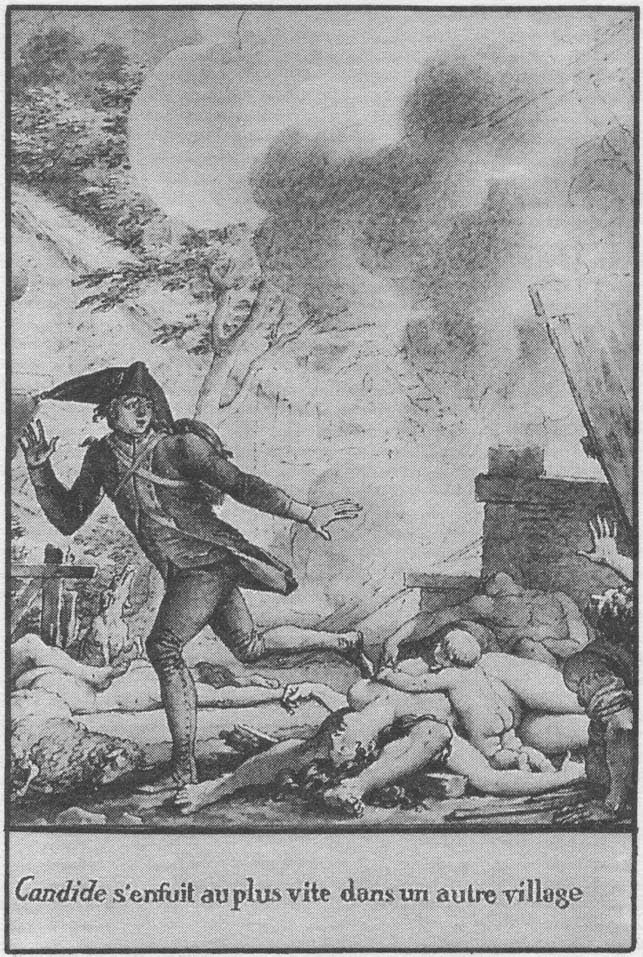

















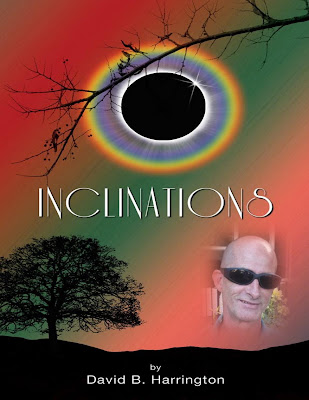
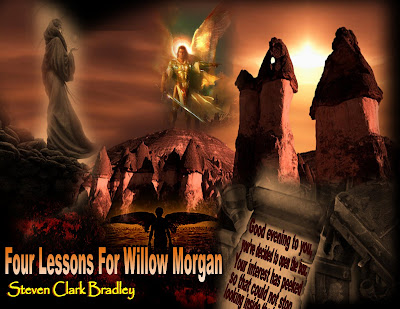

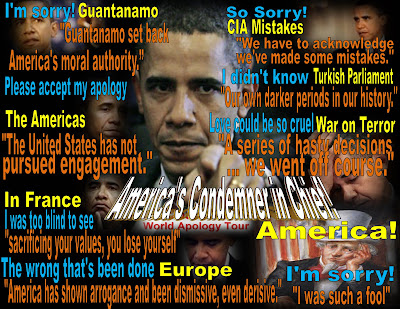






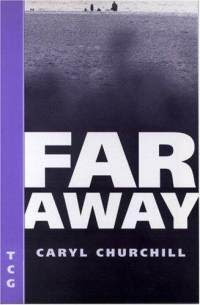






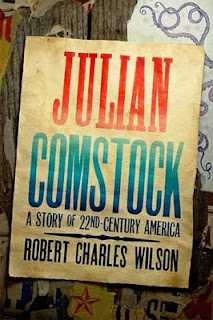
Thanks for the interview, Joanne! Your book is fantastic. :)
Congratulations on your debut novel, Joanne! Sounds like you have more in the works, so we'll look for more from you next year. :)
My husband said there was no point in planning anything for the weekend because the world was ending on Friday. I also heard a radio show about the end of the world today, and I got invited to a Facebook event that was something like wake up and say HA! on 12/22/2012.
I love how your book started from something you watched with your husband. My husband watches that kind of stuff all the time--I haven't been inspired yet, but you never know. I am often pleasantly surprised when I see something sci-fi with him and I had a great time at my first Star Trek convention last year. :) Your book sounds great--I love character-driven in the middle of a sci-fi setting. Let's hope the world keeps going and here's to your book sales continuing with it! :)
Thanks, Joanne and Ang!
Here'e something weird...I was thinking (in the shower) today about this very subject and sort of writing a "what if" scenario about the end of the world. I scared myself so much I had to cut my shower short! :-)
And then I saw ALL THOSE OTHER Dec. 21st references, and I'm a little afraid to read them, too!
So you must be doing something right, Joanne. ;-)
Best of luck with The Rising! And P.S., I don't think the date's a problem. Sci-fi lovers will be drawn to the subject, no matter what (or when!).
I've been asked several times if I'm going to work on Friday, and if I think everyone else should stay home! Someone in my office said they were going to ask for the day off for all of us, just in case. I have so much work to do, that I can't afford to lose a day...